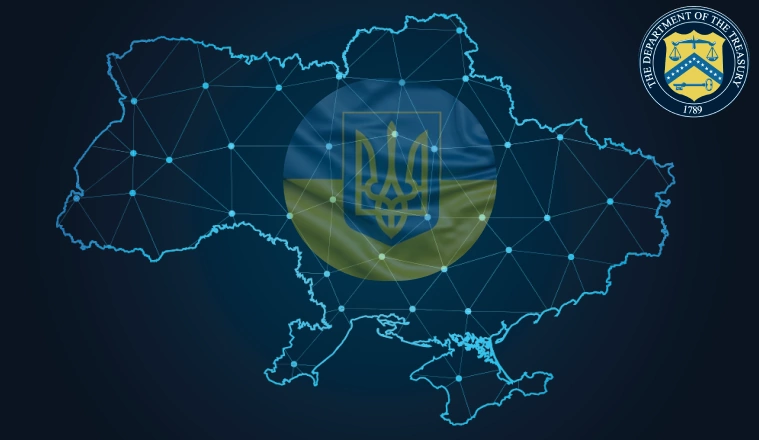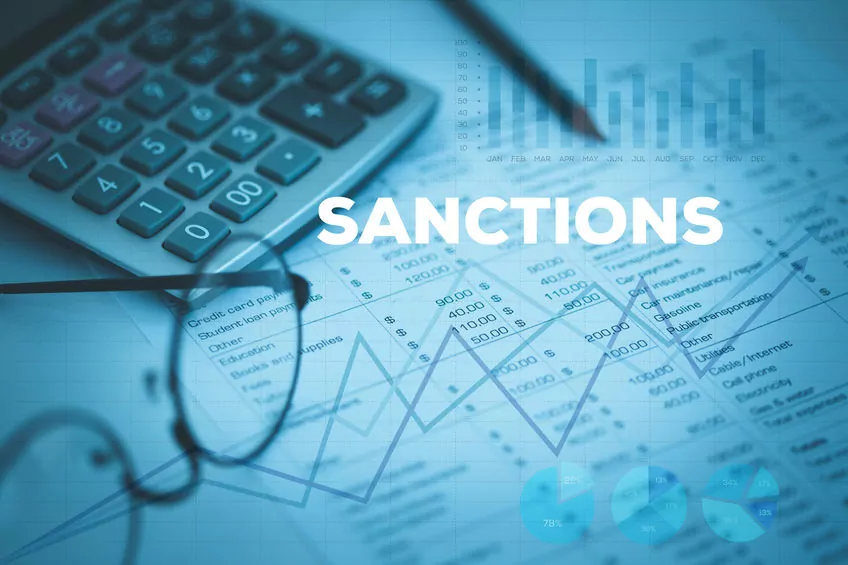
OFAC Ukraine-Related Sanctions
The Office of Foreign Assets Control (OFAC) sanctions by Ukraine are a response to Ukraine’s violation of territorial integrity and sovereignty. These restrictions target specific individuals, companies, and organizations that support aggression against Ukraine or participate in the illegal annexation of the Crimea region of Ukraine.
Sanctions include freezing assets, restricting financial transactions, banning the export and import of certain goods, and limiting access to international markets for entities associated with these actions. They are intended to deter further aggression and support international law and order.
Contact us to receive professional consultation on compliance with Ukraine’s OFAC sanctions and protecting your activities.

What Are Ukraine-Related Sanctions?
OFAC sanctions (Ukraine-related) consist of three main directions aimed at restricting illegal actions against Ukraine. These are:
- Targeted Individuals and Entities – measures against specific individuals and organizations.
- Sectoral Sanctions – restrictions that apply in specific sectors of the economy.
- General Trade Restrictions – rules that regulate export and import.
In the following sections, we will take a detailed look at each of these directions and their specific characteristics.
Asset Blocking Sanctions
Asset freeze sanctions are a tool aimed at freezing the financial and blocking property of certain persons and legal entities that support the annexation of the Crimea region of Ukraine or the destabilization of the situation in Eastern Ukraine. This restriction prohibits access to assets located in the US, as well as interactions with American companies and citizens.
Sanctions are regulated by the following executive orders of the U.S. president according to the United States foreign policy:
- Executive Order 13660 (2014): Freezes the assets of additional persons contributing to the destabilizing situation in Ukraine.
- Executive Order 13661 (2014): Targeted at Russian officials and organizations that support the occupation of Crimea.
- Executive Order 13662 (2014): Expands sanctions on key sectors of the Russian economy, including energy, finance, and defense.
- Executive Order 13685 (2014): Prohibits American companies and individuals from engaging with any enterprises in Crimea.
Removal from the SDN (Specially Designated Nationals) list is only possible if there are justified reasons, such as:
- error in identification;
- significant change in circumstances;
- successful implementation of corrective actions agreed upon with OFAC.
The Specially Designated Nationals (SDN) or blocked persons list ensures strict control over financial flows associated with prohibited actions.
Sectoral Sanctions
Sectoral sanctions are restrictions aimed at key sectors of the economy, specifically energy, defense, and finance, that support conflict. They were introduced by Executive Order 13662, which authorized the development of measures to impact these sectors.
Directives of Executive Order 13662:
- Directive 1: Prohibits the provision of new loans or financing with a repayment term of more than 30 days for specified Russian financial institutions.
- Directive 2: Restricts the provision of new loans or financing with a repayment term of more than 90 days for specified Russian energy companies.
- Directive 3: Prohibits the provision of new loans or financing with a repayment term of more than 30 days for specified Russian defense companies.
- Directive 4: Prohibits the provision of services, technologies, or equipment related to exploration or extraction of oil in deepwater, Arctic, or shale projects in Russia.
Ukraine-Russia-related sanctions limit Russian companies from accessing international financing and technologies, complicating their operations in the specified sectors.
Investment and Trade Embargo on Crimea
The embargo on investments and trade with Crimea signifies a complete prohibition of economic interaction between American companies and citizens in this region. This decision, implemented by OFAC, is aimed at increasing pressure due to the illegal annexation of Crimea.
What is prohibited:
- Investments in businesses located in Crimea.
- Export, re-export, or supply of any goods, services, or technologies to Crimea.
- The import of any goods, services, or technologies from Crimea to the USA.
Who is obligated to ignore the Crimean market:
American companies, financial institutions, legal entities, and individuals are required to avoid any commercial operations related to Crimea.
Responsibility for deals with the Crimean market:
Any operation related to the Crimean market is considered a violation of the OFAC sanctions regime against Ukraine. This can lead to financial penalties, asset freezes, and even criminal liability for those who knowingly ignore these restrictions. All market participants must carefully vet their counterparts to avoid violations.
Laws Governing Ukraine-Related Sanctions
The OFAC sanctions act related to Ukraine is based on a clear legal foundation, which establishes a series of executive orders by the President of the United States.
These sanctions regulations define the mechanisms for implementing sanctions, their scope, and the directions of impact on entities involved in destabilizing the situation in Ukraine and the annexation of Crimea.

Executive Order 13660 (March 6, 2014)
Aimed at freezing assets and blocking property of individuals and organizations that threaten the peace, security, and sovereignty of Ukraine. This order was the first response of the USA to the beginning of the conflict.
Executive Order 13661 (March 17, 2014)
Expanded sanctions on certain persons linked to the Russian Federation who facilitated the annexation of Crimea and destabilization of the situation in Eastern Ukraine.
Executive Order 13662 (March 20, 2014)
Implemented sectoral sanctions that restrict activities in key sectors of the Russian economy, such as energy, finance, and defense. It also involved blocking property of additional persons Contributing to the Situation in Ukraine, including individuals listed in the sectoral sanctions identifications (SSI) list.
Executive Order 13685, (December 19, 2014)
These sanctions imposed a complete ban on investments, trade, and economic interaction between American individuals and companies in Crimea.
Executive Order 13849 (September 20, 2018)
Strengthened sanctions against companies and persons contributing to interference in the US elections and supporting existing restrictions related to Ukraine.
Executive Order 13883 (August 1, 2019)
Expanded the possibilities for imposing sanctions against foreign financial institutions that facilitate destabilization in Ukraine.
Executive Order 14065 (February 21, 2022)
Became the response to Russia’s recognition of the “independence” of the so-called LNR and DNR, by implementing additional sanctions against Russian individuals and companies.
These executive orders ensure a comprehensive approach to the sanctions regime, aimed at protecting Ukraine’s sovereignty and preventing further escalation of the conflict.
Approved Transactions
Within the framework of Ukraine’s OFAC sanctions regime, it’s important to understand that certain transactions may be permitted. They are provided as exceptions to the restrictions and are clearly regulated by the relevant rules.
Permitted transactions include:
- Humanitarian aid: Providing food, medicine, or other humanitarian goods that do not violate sanctions.
- Operations related to personal transfers: For example, supporting close relatives.
- Activities covered by general licenses: This may relate to certain educational, scientific, or informational projects.
Even permitted operations require strict compliance with conditions set by OFAC to avoid violations or legal consequences. All transactions must be carefully reviewed for compliance with current regulations.
General Licenses
General Licenses are permissions from OFAC that automatically allow certain types of activities that are usually prohibited by sanctions regimes. These licenses simplify the process of conducting lawful transactions that fall under specifically defined exceptions.
What is the purpose of general licenses?
They allow for operations that support humanitarian aid, information exchange, scientific research, or the support of basic population needs. General licenses may also cover transactions that are important for international cooperation or providing critically important services.

Who can receive it?
General licenses apply to all entities that meet their conditions. These can include:
- Charitable and humanitarian organizations.
- Educational and scientific institutions.
- Companies that supply goods or services allowed within the sanctions regime.
How to obtain?
The general license does not require a separate application to OFAC lawyers it is automatic for certain categories of activities, but requires compliance with all established conditions. Entities must verify that their activities comply with the provisions of the specific general license and meticulously document each transaction to ensure transparency.
Adhering to the rules set forth by general licenses is mandatory to avoid legal consequences or financial penalties.
Specific Licenses
Specific Licenses are individual permissions from OFAC that allow for transactions or activities usually prohibited by sanctions regimes. They are issued in cases where the activity does not qualify for general licenses but meets certain criteria.
What is the purpose of specific licenses?
These licenses are necessary for carrying out transactions involving important goods or services from a humanitarian, economic, or social perspective but require separate permission. For example, this could involve the implementation of large humanitarian projects, certain financial transactions, or the export of restricted goods.
Who is eligible to receive it?
- Companies that wish to export or import under exceptional circumstances.
- Non-profit organizations that implement humanitarian or educational projects.
- Financial institutions planning transactions with entities related to sanctions must coordinate with OFAC.
To obtain a specific license, one must submit an application to OFAC with the following details:
- Goals of the transaction or project.
- Detailed description of operations and participants.
- Justification for the necessity of permission and confirmation of compliance with U.S. law.
After the submission of documents, OFAC conducts a detailed analysis to ensure that the requested activity complies with the sanctions policy. If approved, the license allows for the specific operation mentioned in the application to be carried out.
Adhering to the terms of a specific license is mandatory, and violating it can lead to serious financial or legal consequences.
What to Expect from Violating Sanctions?
Violating the OFAC sanctions regime on Ukraine can lead to serious financial and legal consequences. The sanctions entail both civil and criminal liability for individuals and organizations that ignore the established restrictions and handle prohibited transactions.
Civil Penalties for Sanctions Violations
Civil penalties are imposed for administrative violations of sanctions. They can reach:
- Up to $250,000 for each violation.
- Or a fine that is twice the value of the illegal transaction.
Civil liability applies in cases where a violation has occurred due to negligence or improper verification of transactions and counterparties. In addition to fines, freezing of assets or revocation of relevant licenses may also be possible.
Criminal Penalties and Legal Risks
Criminal penalties are applied in cases of deliberate and intentional violation of sanctions. They include:
- Fines up to 1 million US dollars.
- Imprisonment for up to 20 years.
Additional legal risks include investigations by law enforcement agencies, loss of business reputation, and restricted access to international markets.
When to Seek Legal Help
Violating the OFAC sanctions regime can lead to fines, asset freezes, or criminal liability. Specifically, transactions with individuals or organizations from SDN list are prohibited and carry serious risks. If you have doubts about whether your activities comply with sanctions, consulting a lawyer is a necessary step.
Benefits of Working with a Sanctions Expert
- Risk analysis: Thorough examination of transactions and agreements to prevent violations.
- Efficiency: Quick resolution of issues to save your time and resources.
- Licensing: Assisting with the process of obtaining OFAC permits.
Reaching out to a lawyer ensures that your activities comply with the law and minimizes risks. Contact us to get professional help.




